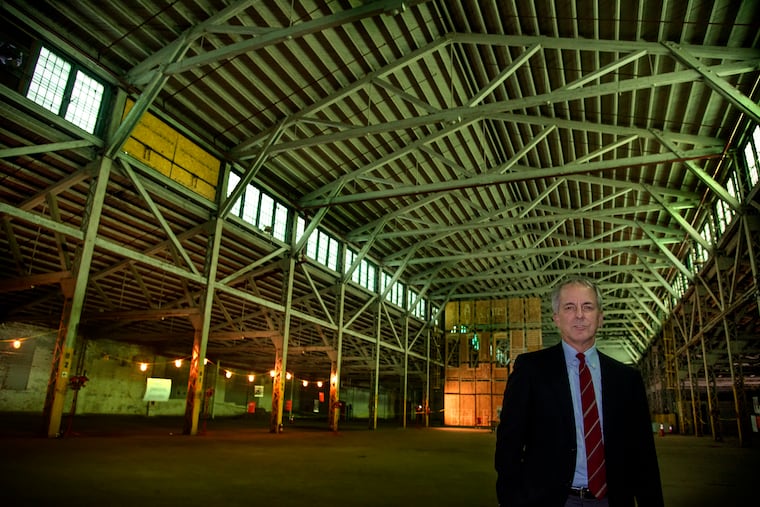Is a key developer’s departure a major setback for Camden’s waterfront?
In the 1980s, some predicted a redeveloped Camden Waterfront would transform the city. That hasn't happened.

Alan Razak stood in the stark but impressive interior of the Victorian-era match factory he hopes to transform into open-loft office space near the Camden Waterfront.
"I really think this can work," the Philadelphia developer said of the block-long, bricked-up landmark last used as a warehouse. "I love this building. I love this location."
Across Delaware Avenue, on land that had been vacant for decades, a 156-unit apartment complex called 11 Cooper is rising fast. A block south and west, the glass-clad corporate headquarters of American Water and the 18-story Camden Partners Tower office building are rapidly approaching completion.
But last week Liberty Property Trust, the marquee developer of 25 central waterfront acres since 2015, announced it will divest itself of the unused portions of its Camden holdings — three sites for office buildings and one earmarked for residential development — as well as its interests in about a dozen Center City and Philadelphia Navy Yard buildings.
"This one project was not going to solve all the challenges of Camden," Liberty senior vice president John Gattuso told me Friday. "But it will continue to turn the dial in a positive direction."
Liberty already has completed most of the infrastructure, including new streets and stormwater management systems. It also has an agreement with a developer to construct an 180-room Hilton Garden Inn overlooking the Delaware River north of American Water, and is in serious negotiations with potential tenants or buyers for one of the remaining office sites, he said.
Gattuso and others insisted that Liberty's strategic move is not a comment on Camden or its mile-long waterfront, where a scenic promenade hugs the Delaware, and the Adventure Aquarium, Battleship New Jersey, BB&T Pavilion, and Camden Children's Garden draw hundreds of thousands of visitors annually.
"A decision by a single company is not going to change the trajectory of the waterfront," said Kris Kolluri, president and CEO of the Cooper's Ferry Partnership. The public-private agency handles much of the redevelopment work along the Delaware River, downtown, and in the city's neighborhoods.
By email, George E. Norcross 3d, board chairman of the Cooper Health System and a dominant force in waterfront and downtown development, said: "We do not expect Liberty's business decision to have an impact on the city."
Camden's "upward trajectory, while not complete, is firmly set," he said.
Nevertheless, it's difficult to see Liberty's departure as good news — particularly given that the company in July wrote down the value of its $80 million Camden project by $26 million. CEO William P. Hankowsky, who worked for the city in the 1970s and early '80s as community development director, cited less-than-robust demand for waterfront office space as the major reason.
I've written about the Camden Waterfront's evolution from a postindustrial wasteland into an attractive, if still diffuse, mixed-use development for more than 30 years. I've seen plans, projects, and companies come and go, but I've also watched the creation of a genuine place where none existed, and the emergence of a destination for city and suburban residents alike.
This is no small achievement anywhere and especially in Camden, where even modest undertakings often prove excruciatingly complex and setback-prone, or at the very least slow to reach fruition.
Take the proposed Ruby Match Factory office project proposed by Razak for his landmark building, which is in surprisingly good condition. "Renovation Will Start Next Year," a headline boldly predicted — on Nov. 18, 2015.
Many nibbles but no bites thus far. So the old match factory is up for sale, but "we're continuing to talk to [prospective] tenants," said Razak, who also developed the Philadelphia 76ers' training complex.
That project, like nearly everything else developed on the waterfront or downtown during the last five years, has been deeply subsidized by state tax breaks and other incentives offered through the New Jersey Economic Development Authority.
Kolluri said concerns about the scheduled June 30, 2019, sunset of the Grow NJ program was somewhat allayed by Gov. Murphy's announcement of a statewide economic development plan earlier this month. The plan calls for providing tax incentives for economic development in a different format that would require legislative approval, EDA spokesperson Virginia Pellerin said.
Kolluri also cited what he called "the next big thing" expected to boost redevelopment in urban areas: the Trump administration's Opportunity Zone program.
Although a next big thing sometimes turns out to be the next big nothing, I'm encouraged that other projects adjacent or close to the waterfront are proceeding as well.
The enormous Victor Talking Machine Co. building, most recently the Camden school district's headquarters, is being restored and renovated for offices, and the long-derelict Pierre Apartments on Cooper Street, one of a handful of Art Deco buildings in the city, is being readied for residential tenants.
I'm also encouraged by Liberty's savvy effort to better connect the waterfront with the city's existing street grid. It also helps make the waterfront a part of the city, and vice versa.
So after three years of effort by Liberty and three decades of efforts by many others, Camden's waterfront — like the city around it and like cities everywhere — is very much a work in progress.
There are still too many parking lots and disconnected places, and too little private — as opposed to publicly subsidized — development.
But I believe the work, and the progress, will continue.